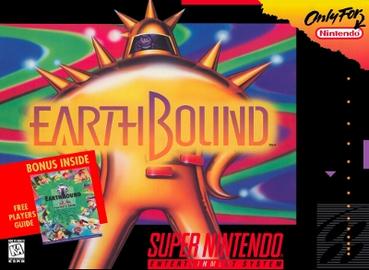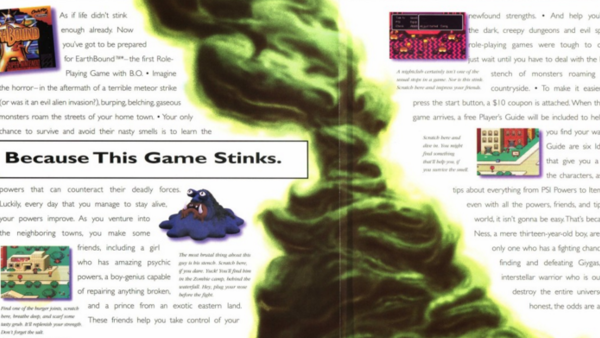
Nintendo is largely characterized by the quality of its video games and the massive popularity they achieve. Franchises such as The Legend of Zelda, Pokémon, and Super Mario Bros. have wormed their way into popular culture to the point where if one were to ask a random passerby, there’s a high chance that they can name at least one Nintendo property. However, despite this, not everything Nintendo touches is gold. For every Super Mario Odyssey, there’s a Metroid: Other M, which is to say that there are several obscure and poorly-selling games that the company has published. However, just because a game doesn’t sell well doesn’t necessarily mean that it’s poorly made or flat-out “bad.” One significant example of this that comes to mind is Earthbound (1994) for the Super Nintendo Entertainment System, a game filled with passion that met a miserable reception.

What is Earthbound?
Developed by Ape Inc. & HAL Laboratory, spearheaded by Shigetaso Itoi, and published by Nintendo, Earthbound was a turn-based RPG in which a child named Ness goes on an adventure to stop an otherworldly threat in the form of the time-traveling alien Giygas. On his travels, he makes 3 friends who travel with him across the world and even into the past to save Earth from Giygas’s invasion. The game is charming, comedic, and has very fleshed-out gameplay.
Interestingly, Earthbound wasn’t a standalone game. As a matter of fact, in Japan, it was the second part of a three-part series known as Mother. The Mother games were positively received in Japan, and as such were slated to be localized. The first game’s localization was eventually canceled (though it would later be published as Earthbound Beginnings), and so Nintendo decided to change the name from the sequel’s original title of Mother 2 to Earthbound.
However, despite the game’s success in Japan, it wouldn’t reach nearly the same amount of sales in the United States, and the game was deemed a commercial failure.
So What Happened?
Every product has a chance of failure for various reasons, but what in particular caused Earthbound to receive a fraction of the success that Mother 2 did? The largest culprit for this is likely its marketing campaign, which was both awfully expensive and just the normal kind of awful. The game was given the sarcastic tagline of “This Game Stinks,” and scratch-and-sniff advertisements involving disgusting smells were the most prominent aspect of the campaign.

This reliance on gross-out humor completely backfired and probably did more harm than good for the game’s reputation. On top of this, it’s possible that there simply wasn’t that much interest in the genre at the time. Funnily enough, there is another example of such an occurrence with the Metroid video game franchise. The games sell far more in the United States than in Japan, as the franchise may simply be more appealing to American audiences.
What about now?
Earthbound has aged surprisingly well considering it turns 30 this year, and it has cemented itself as something of a classic since its rocky release. Despite how poorly it was initially received, a significant amount of people still played the game and effectively gave it a second life. Earthbound has had a significant impact on several modern games, such as Undertale and Omori. It too has become a significant part of pop culture and has even appeared in other Nintendo series such as Super Smash Bros. It is worth giving a try, and though it isn’t perfect, it’s captured the hearts of many in the modern day.






